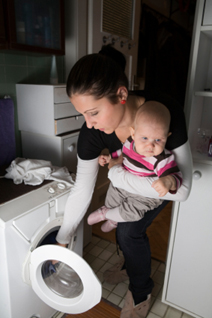What Is Sleep Hygiene?
Good Sleep Depends on What You Do Before Bed

We’ve heard of personal hygiene, dental hygiene, and, of course, sexual hygiene — but what in the world is sleep hygiene? It sounds like it ought to have something to do with bathing before bedtime or not getting cracker crumbs in the sheets. So just what are we talking about here?
Actually, sleep hygiene is just an unfamiliar way of describing a basic, common sense idea. Hygiene, you’ll note, is defined as the science of good health practices; or more specifically, encouraging things that promote health and discouraging things that cause disease. So by extension, sleep hygiene is simply doing the things that promote good sleep and avoiding the things that interfere with it.
The main insight here is important but easy to overlook: how well you sleep at night is heavily influenced by what you do while you’re awake. This becomes especially true in the last few hours of the evening, just before you go to bed.
Which is why we want to draw your attention now to all those little habits and rituals that make up a typical evening before bedtime. You might find that by taking a close look at your own bedtime routine, and making a few simple adjustments to it, you could turn a lot of frustrating nights of tossing and turning into peaceful nights of good, reliable sleep.
Good Sleep Hygiene Can Help You:
- Fall asleep faster
- Feel more relaxed and worry less as you drift off
- Sleep through the night without frequent awakenings
- Feel more refreshed in the morning and have more energy throughout the day
- Restore a sense of balance in your life
We’ll show you how with some practical, easy-to-follow tips.
The Bedtime Routine
If you asked most people what kind of bedtime routine they had, they’d probably say “none.” Right. For a lot of us, our evenings are likely to be a bit haphazard, if not downright hectic. Modern life tends to compress our time at night. You get shanghaied into working later hours in your job, you have to battle your way through a long commute home, or maybe you have kids with a full schedule of extracurricular activities. Dinner usually gets pushed back late and everything else follows from there.

After dinner, you might find yourself running around like a crazy person trying to get things done before bedtime; things like paying bills, helping the kids with their schoolwork, answering e-mails (ever notice how it’s always the little, niggling “5-minute” chores that seem to take up the most time? Grrrrr!). The result is that just when you should be relaxing and winding down for the night, you’ve got yourself wound up, thinking about unfinished tasks, what you need to do tomorrow, worrying and ruminating over problems. A revved up mind is a great way to sabotage sleep.
Or maybe you try to decompress a little before you go to bed by plopping down on the couch and clicking on the TV. You end up dozing off listening to some hyperventilating local newscaster reporting on the disaster de jour. By the time you come around again, they’re already yukking it up on the late night talk shows — so you have to get up and stagger off to bed like a zombie. When morning comes, instead of feeling refreshed, you feel just plain burnt out.
Making a Place for Good Sleep Hygiene
Life is messy. We have too many priorities pulling us in too many directions. We are obliged to adapt ourselves to the demands and the schedules of the real world. And we have to find a way to cram our personal lives into the spaces left over. It seems like our need for sleep is locked in a kind of three-way tug-of-war with our job responsibilities and our desire for leisure and family time. So how do you make room for good sleep hygiene in all of this?
The fact is that nobody is ever going to achieve the kind of ideal sleep hygiene that sites like this often breezily prescribe. So don’t get too bogged down in the dos and don’ts, trying to conform rigidly to a list of commandments or eliminating every last conceivable threat to sleep. It’s the same attitude you’d take in other forms of hygiene, where the point is to be a reasonably clean person — not to become a germ-phobe.

The most important thing is simply to make an overall change in your mentality toward sleep. Recognize that your body and mind just can’t shift from top-gear activity to serene calmness in the blink of an eye. They need a little help in order to make the transition. Learn how to pace yourself so that, as the evening comes to a close, you’re doing things to help you relax and get into a peaceful, worry-free state-of-mind. Carve out 30 minutes to an hour before bedtime as your designated time to unwind and do everything you can to stay faithful to this time.
Use common sense and know your own needs. Everyone has a different make-up; different things work for different people. Pay attention to your own patterns and try to spot the things that promote good sleep in you; and keep a lookout for the things that seem to be disruptive. Find out what works for you and what doesn’t.
Life really is a three-way balance between work, leisure, and sleep. This inevitably involves making trade-offs. But it doesn’t always have to be thought of as a zero-sum game. If you devote more of your time to getting better sleep, you may actually find that there’s more of you left over for the other things in life, because you’ll have that much more energy and good spirit in you when you’re awake. This is ultimately about restoring balance.
What is Sleep Hygiene and What Isn’t
We’ve pulled together a quick list of recommendations commonly given by sleep experts for achieving good sleep hygiene. The list touches on everything from pre-bedtime rituals and activities, to the importance of what you eat and drink in the evenings, to making your bedroom a sleep-conducive environment.
Be consistent about what time you go to bed and what time you get up, even on weekends and vacations. The idea here is to keep the rhythms of your body in tune with you daily schedule without throwing your internal clock a lot of curve balls. You want to condition your body to just naturally expect that 10:30 P.M. (or whatever) means bedtime. This will make it much easier to fall asleep fast and wake up right when you need to; and you’ll sleep much more soundly.
Don’t let naps interfere with good nighttime sleep. Under certain circumstances, napping can be a great way to make up for lost sleep or just to get a second wind. But if you’re already having trouble sleeping at night, it may be best to try to push on through the rest of the day.
Watch your evening caffeine intake. Caffeine is wonderful stuff; especially first thing in the morning or mid-afternoon when you need a little extra boost. The problem comes in the evening when its stimulating effects aren’t so desirable. Experts generally recommend that you avoid caffeine 4 to 6 hours before bedtime. But simple moderation may be a more realistic goal. Use your own best judgment.
Can alcohol disrupt sleep? Although it’s true that drink can initially help you to feel sleepy and drop off easily, there is said to be a stimulative rebound effect that comes later in the night as the alcohol wears off, causing arousal and fragmented sleep. This is definitely something to watch out for. But in situations of moderate consumption — i.e. one or two drinks — the rebound effect is likely to be pretty negligible for most people. Again, you’ll need to use your own judgment.
Be advised that nicotine can also interfere with good sleep. Nicotine acts, in part, as a stimulant, so it definitely has the potential to make it harder to fall asleep and to sleep consistently.
Medications and sleep. If you are taking any medications — prescription or otherwise — be aware of how they might be influencing your sleep. Some medications have side-effects that can work against you here. If you suspect that something your doctor has prescribed is disrupting your sleep, talk with her about it (it’s usually not a good idea to just stop taking it). She may be able to improve things by adjusting the dosage, changing the time of day you take it, or prescribing a different medication.
Don’t exercise after dinner. Getting plenty of exercise is an important part of staying healthy. But make sure not to do it too near your bedtime. Your body needs enough time to wind down. So, if you work out, do it at least 4 hours before you go to bed.
Don’t worry, be happy. Stress and worry are the sworn enemies of good sleep. If you’ve got problems in your life (and don’t we all) your best bet for getting a handle on them is to get a good night’s sleep. Period. And remember, worry never solved anything — especially after 9:00 P.M.
Be good to yourself. Make a commitment to spend the last hour or so before you go to
bed indulging in something that helps you to relax. Make it something relatively quiet and not too stimulating; maybe a little light reading or listening to soft music. Try taking a hot bath or shower about 90 minutes before you turn in. A light snack before bedtime can also be beneficial (just avoid spicy foods or anything too rich or heavy). Relaxation techniques such as breathing exercises, massage, or yoga, as well as meditation and prayer are excellent ways to center yourself and prepare the mind and body for sleep. Many people have had good results using aromatherapy or giving themselves autosuggestions.
How light affects sleep cycles. Your body sets its internal clock by the level of light it senses in your surroundings. So in order to keep your sleep cycles in tune with your daily schedule, you want to give yourself just the right cues. In the evening, as bedtime approaches, you want to keep levels of artificial light low and soft. In the morning, you want to do the opposite, by making a point to expose yourself to light.
Make your bedroom a sleep-friendly environment. Do everything you can to optimize your surroundings for a good night’s sleep. You want to make your room a comfortable, appealing place, that’s cool, well ventilated, and quiet. You also want it to be calm and free of clutter and distractions. Make it a bedroom and nothing else: experts say the only two things your bed should be used for is sleep and sex.
To TV or not to TV? It’s generally recommended that you not watch television in bed since this just adds stimulation at a time when you need calm. Some sleep experts disapprove of even having the thing in your bedroom at all! However, many people report that they simply cannot sleep unless they’ve got the TV going in the background. They need a source of noise to drown out obtrusive sounds or distract their minds away from thoughts or worries. We have no answer to this controversy, except to say: do whatever works best for you.
Make yourself comfortable. Good bedding makes a difference so don’t be afraid to pay a little more for high-quality sheets and blankets. This is an investment that will pay dividends in the form of significantly better sleep. The same goes for what you wear to bed. It’s worth it to go for something that really makes you feel comfortable. When it comes to the quality of your sleep, this is one area where it makes sense to splurge.
Strange Bedfellows. Most of us share our beds with a partner or spouse. This, of course, means compromising when it comes to personal preferences about the sleep environment: room temperature, light levels, bedding, whether or not to have the TV on, etc. The spirit of give-and-take is always the essence of a happy relationship, so learn to take each other’s needs into consideration and be tolerant of one another’s foibles.
Strange Bedfellows, Part 2. Do your pets sleep with you, either in the bedroom, or right in bed with you? Nothing really wrong with that. Just make sure that there’s never any doubt who’s alpha-dog. In other words, manage the sleeping arrangement in such a way that you and your animals get the benefit of being together, without compromising your own sleep.

0 Comments on “What is Sleep Hygiene?”